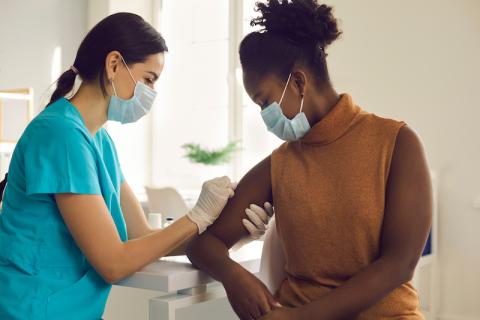
New research undertaken by researchers at the University of Edinburgh’s Usher Institute, has confirmed that a first booster dose reduced the risk of severe COVID-19 during the Omicron wave.
However, some people remained at higher risk of becoming severely unwell, including older people and people with multiple health conditions.
Current UK policy is to offer further booster doses to people at high risk of serious COVID-19 illness. However, there is still some uncertainty over who will benefit most from being prioritised for a booster.
The Joint Committee on Vaccination and Immunisation (JCVI), which advises the UK Government on vaccine policy, asked the research team to find out which groups were still at increased risk of becoming seriously ill with COVID-19 following an Omicron infection, even after a first booster vaccine.
It is important to note that this study was undertaken before the new Pfizer and Moderna bi-valent vaccines became available. These vaccines have been updated to tackle the Omicron variant of the virus, and are the vaccines now being used for all booster doses in the UK.
Of the 16.2 million people included in the study, 13.8 million had received a booster dose of either Pfizer or Moderna’s original vaccine.
The results, published in The Lancet, showed that the risk of hospital admission or death from COVID-19 reduced for people who had a booster vaccine.
Calculated for every one million people vaccinated, there were approximately:
- 8,800 cases of severe COVID-19 in people who hadn’t had a first booster.
- 7,600 cases of severe COVID-19 in people who had received a first booster.
However, some groups of people were still at higher risk after their primary and booster vaccines, compared to the general population. These were: older people, people with multiple health conditions, and people with certain health conditions including severe obesity, chronic kidney disease, and rare nervous system conditions, as well as people whose immune system is suppressed by a treatment for a condition.
People in the following categories were shown to be at particularly high risk, even after a booster vaccine:
- People on treatments which suppress the immune system
- People with a history of a rare nervous system (neurological) condition
- People with chronic kidney disease (stage 4 or 5).
The level of risk increased with the number of existing health conditions that people have.
The results of this study will help to identify people who should be prioritised for vaccine boosters and treatments for COVID-19.
This study was supported by the National Core Studies Immunity Programme.

